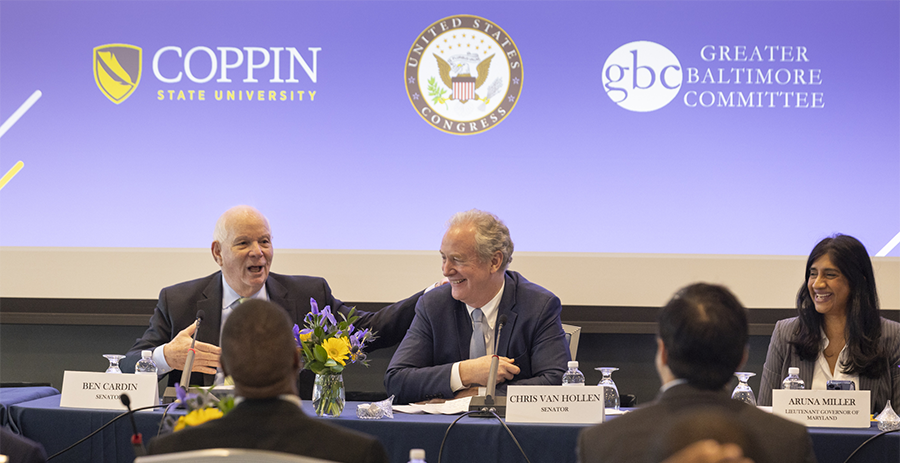- The Greater Baltimore Committee (GBC) roundtable discussed the Tech Hub designation and Phase 2 funding
- The Baltimore region was designated a federal Tech Hub in October 2023, granting access to $10 billion in funding over five years
- The Phase 2 application focuses on Biotechnology and Artificial Intelligence, seeking $70 million in federal funding
- The proposal aims to create a sustainable workforce pipeline, establish biomanufacturing facilities, and foster innovation
- The consortium estimates the Tech Hub investment could create 32,700 direct jobs and generate $8 billion in real value-add
Understanding the GBC Roundtable Discussion on Tech Hub Funding
In a recent roundtable discussion hosted by the Greater Baltimore Committee (GBC) at Coppin State University, key figures such as U.S. Senators Ben Cardin and Chris Van Hollen, alongside Lt. Gov. Aruna Miller, came together to deliberate on the Baltimore Region’s federal Tech Hub designation and the submission of the Phase 2 application for funding. This gathering marked a significant step in the region’s pursuit of technological innovation and economic development, leveraging the opportunity presented by the Tech Hub designation.
The Significance of the Tech Hub Designation in Driving Economic Growth
The designation of the Baltimore region as one of the 31 federal Tech Hubs by the Biden-Harris administration in October 2023 holds immense promise for the area’s tech and innovation ecosystem. This designation opens up access to a substantial portion of the $10 billion in funding allocated over five years to fuel technology- and innovation-centric growth. The Tech Hub status signifies a recognition of the region’s potential to drive forward advancements in various tech fields.
During the roundtable discussion, Senator Cardin emphasized the pivotal role of the Tech Hub designation in spurring economic growth and job creation within the region. Senator Van Hollen echoed this sentiment, underlining the importance of innovation in addressing critical challenges and fostering prosperity. Lt. Gov. Aruna Miller reiterated the state’s unwavering support for initiatives that promote innovation and benefit the residents of Maryland.
Related Video

Exploring the Phase 2 Application and Funding Prospects
The Phase 2 application, recently submitted, focuses on two key areas: Biotechnology and Artificial Intelligence, and seeks a substantial amount of federal funding totaling $70 million with a matching contribution of $7.7 million. The proposal comprises five projects designed to establish a sustainable pipeline of skilled workers for future tech needs, develop state-of-the-art biomanufacturing facilities, and nurture innovation and entrepreneurship in the region.
Of particular significance is the emphasis on workforce and equity within the consortium. With 21% of member organizations being women-led and 29% BIPOC-led, there is a deliberate effort to ensure diversity and inclusivity in the development of tech initiatives. The estimated impact of these projects is substantial, with projections indicating the creation of 32,700 direct jobs and 65,600 supplier and induced jobs across various sectors and skill levels over the span of 10 years.
Forecasting the Future Impact of Tech Hub Funding
The Greater Baltimore Committee envisions a significant transformative effect from the Tech Hub investment. Over a decade, the five component projects are expected to generate $8 billion in real value-add, equivalent to 3.2% of the regional GDP. Additionally, the investment is anticipated to yield a considerable return on investment, with an estimated 14% return over the same period. These projections underscore the potential for the Tech Hub funding to catalyze growth and innovation across the region’s tech landscape.
As the consortium eagerly awaits a decision on Phase 2 funding expected later this summer, the momentum and commitment displayed in pursuing these tech initiatives are indicative of a shared vision for driving progress and prosperity through technological advancement. The collaboration among tech firms, academic institutions, government entities, and workforce development partners reflects a unified effort towards leveraging the Tech Hub designation to its fullest potential.
Links to additional Resources: 1. https://www.gbc.org/ 2. https://www.coppin.edu/ 3. https://www.maryland.gov/